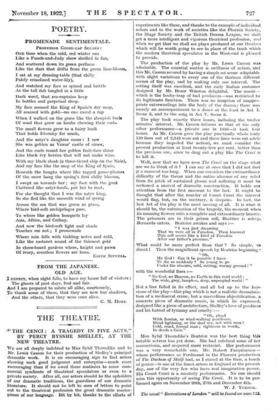THE THEATRE.
1` THE CENCI : A TRAGEDY IN FIVE ACTS," BY PERCY BYSSHE SHELLEY, AT THE NEW THEATRE.
1VE are all deeply indebted to Miss Sybil Thorndike and to Mr. Lewis Casson for their production of Shelley's principal dramatic work. It is an encouraging sign to find actors showing such good judgment and enterprise—much more encouraging than if we owed these matinees to some com- mercial syndicate of theatrical speculators or even to a private society. After all, our actors should be the upholders of our dramatic traditions, the guardians of our dramatic literature. It should not be left to men of letters to point out to the theatrical profession the great dramatic master- ..pieces of our language. Bit by bit, thanks to the efforts of experiments like these, and thanks to the example of individual actors and to the work of societies like the Phoenix Society, the Stage Society and the British Drama League, we shall get a more intelligent and vigorous theatrical profession, and when we get that we shall see plays produced at our theatres which will be worth going to see in place of the trash which
the modern theatrical speculator in the West-end is pleased to provide.
The production of the play by Mr. Lewis Casson was admirable. The essential matter is swiftness of action, and this Mr. Casson secured by having a simple set scene adaptable with slight variations to every one of the thirteen different scenes of the play, and by making only one interval. The setting itself was excellent, and the early Italian costumes designed by Mr. Bruce Winston delightful. The music— which is the booby-trap of bad producers—was restricted to its legitimate function. There was no irruption of inappro- priate caterwaulings into the body of the drama ; there was
merely an accompaniment to a dance at the feast in Act I. Scene 3, and to the song in Act V. Scene 8.
The play took exactly three hours, including the twelve minutes' interval. Mr. Casson informs us that at the only other performance—a private one in 1886—it took four hours. As Mr. Casson gave the play practically whole (only 150 lines out of 2,343 were cut and these lines were cut solely because they impeded the action), we must consider the
present production at least twenty-five per cent. better than the previous one, since to drag out a play like The Cenci is to kill it.
Well, now that we have seen The Cenci on the stage what are we to think of it ? I can say at once that I did not find it a moment too long. When one considers the extraordinary
difficulty of the theme and the entire absence of any relief from its pitch of sustained gloom and suffering it must be reckoned a marvel of dramatic construction. It holds out attention from the first moment to the last. It might be thought that after the murder of Count Cenci the interest would flag, but, on the contrary, it deepens. In fact, the last Act of the play is the most moving of all. It is what it should be, the culmination of the tragedy, the moment when its meaning flowers with a complete and extraordinary beauty.
The prisoners are in their prison cell, Beatrice is asleep. Bernardo enters. Beatrice awakes and says :-
" I was just dreaming That we were all in Paradise. Thou knowest This cell seems like a kind of Paradise After our father's presence."
What could be more perfect than that ? So simple, so direct I Then the magnificent speech by Beatrice beginning
" Oh, My God I Can it be possible I have To die so suddenly f So young to go
Under the obscure, cold, rotting, wormy ground 1 " with the wonderful lines :- " No God, no Heaven, no Earth in this void world ; The wide, grey, lampless, deep, unpoopled world ! "
Not a line failed in its effect, and all led up to the key- stone of the play—this play which is not a realistic dramatiza- tion of a mediaeval crime, but a marvellous objectification, a concrete piece of dramatic music, in which lie expressed, designed like a piece of architecture, Shelley's love of goodness and his hatred of tyranny and cruelty :— " Oh, plead
With famine, or wind-walking pestilence, Blind lightning, or the deaf sea, not with man I Cold, cruel, formal man ; righteous in words, In deeds a Cain."
Miss Sybil Thorndike's Beatrice was the best thing this notable actress has yet done. She had subdued some of her mannerisms, and acquired more restraint. Her performance was a very remarkable one. Mr. Robert Farquharson— whose performance as Ferdinand in the Phoenix production of The Duchess of Malfi had, as I stated at the time, a touch of genius—is one of the finest actors in England at the present day, one of the very few who have real imaginative power. His Count Cenci is a masterly performance. No one should miss this opportunity of seeing The Cenci. It is to be per- formed again on November 20th, 27th and December 4th.
W. J. TURNER.
The usual " Recreations of London" will belound on vase 735.






































 Previous page
Previous page